Exploring the Spaces Between with Safekeeper
“we pretty specifically set out to capture this Northwestern-like 90s indie rock sound and I haven’t heard a lot of bands do that other than in little bits and pieces”
Safekeeper combines the grit of noise rock perfectly with the laidback slump of slacker rock to create songs like their recent release “Halloweekend.” The cream in their indie rock mixture is their specific ability to swirl together the spacey guitar harmonies with cottony synths. Safekeeper member Zachary Visconti sat down with me to talk about the band, their inspirations, and more. He credits members Ben Ward, Jake Ward, Gail McDonald-Crook, Oliver Mueller, Paul Burnsworth and Jakob Mueller for their work in Safekeeper’s recent years. Zachary is just as laidback and heartfelt as his music is, talking with the ease of sincerity as we discussed the inspiration behind two of their albums.
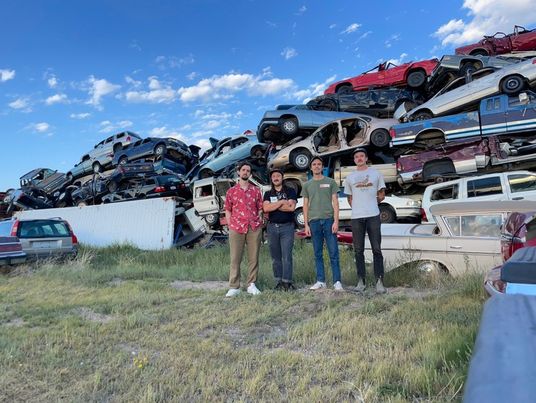
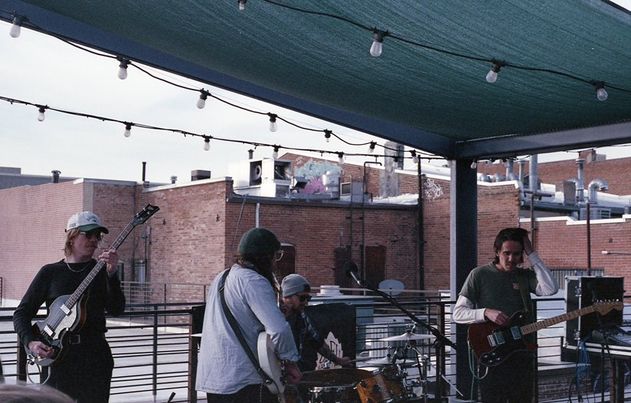
“I think I was kind of grappling with this idea of how far apart people felt, especially at that time, and how important human relationships are and kind of the dichotomy of the space between people, or celestial bodies in that case, and the gravity that pulls us together”
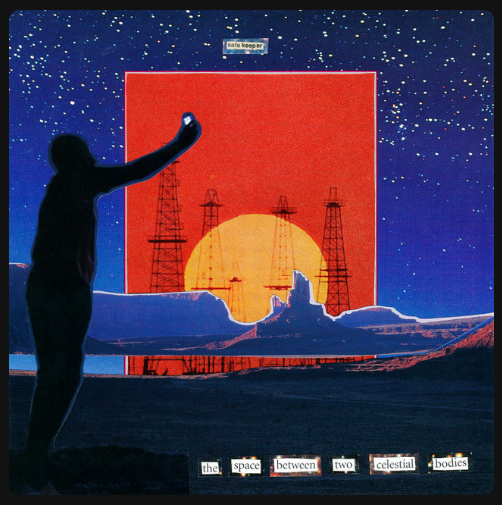
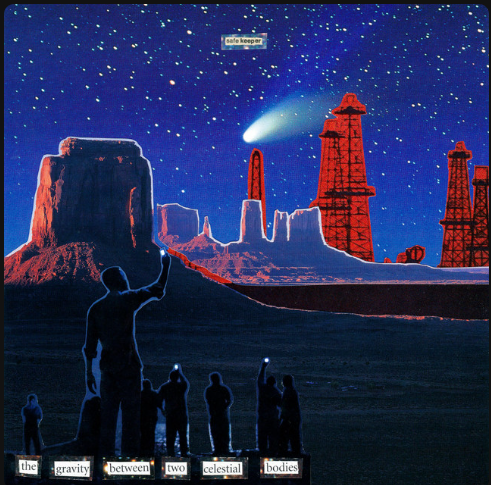
Slacker rock comes from a history of being the gritty flip side of genres like Jangle Pop but you can still hear the bright melodies. Safekeeper is no exception to this, their melodies stick to the surface of the production like static felt. The vocals are a refreshing addition to their take on this genre, the soft fluidity complementing the hazy roominess of their songs. EP on sludge summit definitely feels like the flip side of brighter indie rock songs, with two winding, begging 6-minute songs. Safekeeper explores some of their softer, more ambient sides as well as their rougher, emo sides.
“there are a lot of bands, especially from the 90s, that I looked up to that did that and would touch on all these different genres really successfully and then form genres of their own and so it’s a little bit of that attitude with maybe varying success”
Their earlier EP bummer beach bonanza is full of noise rock paired with existential lyrics, the gloom paired with the lo-fi creep of the guitars sets the mood for this hidden gem of noise rock. The dripping, sloppy guitars feel artistic and purposeful, the catchy power pop melodies left behind for some crawling lines on top of whining vocals. It’s always the cherry on top when the artists match their music so perfectly as Safekeeper does, Zachary speaks of a steadfast, unbothered passion for music as a way to express emotions and connect with others. I also agree with them in the sentiment that Safekeeper stands apart due to its heartfelt commitment to exploring the spaces around genres, the calm and embracing energy of their music impossible not to enjoy.
If you like… Pavement, herbal teas, and bucket hats you will like their song “halloweekend”.
If you like… the smell of grass, Neutral Milk Hotel, and sherbert you will like their song “paradise no.9”
If you like… Car Seat Headrest and burnt marshmallows you will like their song “neverending escapist dream”.
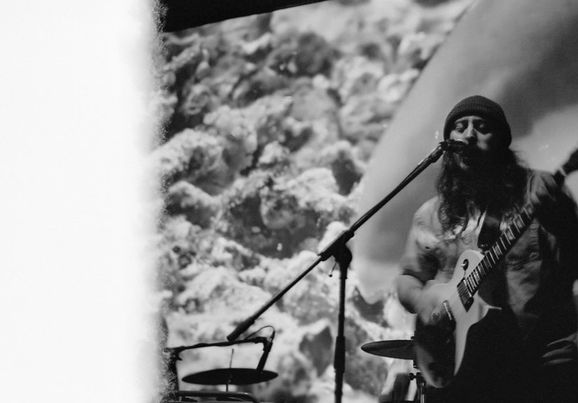
Interview
Z: My name is Zach Bisconti, and the band has been kind of a revolving cast over the years. I do most of the writing with one of my childhood friends named Matt Scorca. We’ve been playing music together for, I don’t know, 15 years or so. We’ve played with a lot of musicians in Fort Collins including Ben Ward, who’s also a pretty regular part of the lineup since the beginning, and then other than that, it’s just whoever’s around at the time.
Q: The ‘revolving door’ as you call it, is that out of necessity or something you find key to keeping the band creative?
Z: Definitely necessity at times. I do think it has kept us creative and like on our toes a little bit, and it’s been cool. I mean, I’ve got to play with a lot of really cool musicians in town.
Q: You said it was you and Matt writing from the very beginning. How did you two meet, you said something about childhood friends.
Z: Yep. We went to junior high and high school together, out in California where he still lives. So, he’ll come out and might do little writing sessions and then go back and sometimes I’ll go up there. My family still lives out there, so I’ll see them.
Q: You said Ben was another big factor as well, how did you guys meet?
Z: I met Ben through his brother, who actually also has played in Safekeeper more recently, but I went to college with his brother, Jake Ward, and then met them sometime before moving to town. So, we’ve kind of become good friends too over the years. For the past couple of years, Jake and Ben both have been playing in the band which has been really really cool, and then more recently we’ve had the Mueller brothers playing in the band. So, it’s kind of funny swapping one set of siblings out for another. I also think it’s just such a unique experience playing with people who have played for such a long time together. I don’t have siblings that I do that with, but Matt is the closest thing, it’s been fun to see those dynamics between the Ward brothers.
Q: How do you see the members adding to the specifics of the band aesthetic, genre, or whatever you want to call it, the sound that makes you, you?
Z: I think there’s always going to be personality changes you know, so the culture of the band has kind of shifted with different members and stuff which has also been interesting to see. I would say that I tried pretty hard to give everyone the opportunity to contribute as much or as little as they wanted to. The recordings for example. I would say particularly Ben over the years, he’s been involved in every recording process. I should say with each new release he’s done a little bit more and it’s been kind of cool to see him evolve into playing a role in the shape of the sound. I feel like as we’ve had members that have played with us for longer you kind of see the sounds take shape around to them and I think that’s cool. I mean it definitely does add a creative element to it. Just for me, learning to work with other musicians and stuff. I also think that both personality and aesthetic factor has been cool to see all the different shapes Safekeeper has taken over the years.
Q: What does your current setup look like? I’ve seen you guys be a four-piece, five-piece.
Z: yes. Yeah. Most recently we’ve been doing a five-piece thing and it’s basically two guitars, bass, drums, and then a synth and some backing vocals too. I think we’ll kind of keep to that format going forward right now at least. But again, it has changed with necessity. For a while, I was playing bass guitar over the summer just because I couldn’t find a bassist at the time to replace Jake, who moved away, and so just kind of when things came up for people. When there are shows that I want to schedule I try to fill in the gaps a little bit and that’s how we end up playing weird like three-piece gigs and I don’t know experimenting with the lineup a little bit.
Q: What would you say is your main inspiration behind the band? Has it changed over the years?
Z: Yeah, that’s a good question. I mean writing music has been a part of my life for a really long time. Just as a means of coping with the world, you know life can be tough and people can find different outlets for those things. But as far as I can remember, music and poetry have always kind of been my outlets for that. So, that’s something that hasn’t really changed in the time of Safekeeper. I mean, reasons why I’ve done it have been slightly different here and there over the years, and as far as I guess, general inspiration, I don’t know. Other art, of course, and I would say though it really does come back to that core of just like me processing life and the world. That’s what inspires me to work on songs.
Q: When writing, do you find you have an image in your mind that you’re aspiring to get to in your songs? Or is it just building it as it feels?
Z: I think with each new song and new larger release there’s at least an attempt to do something different than I’ve done in the past. So, kind of a faceless goal, you know, but always wanting to outdo myself artistically. I don’t know if there’s a specific place or image that I want to reach. I don’t know though. I mean, music has also just given me some of the more interesting, unique experiences I’ve ever had and so I just think seeing where that takes me is like a long-term image or whatever.
Q: You said ‘seeing where it takes you’, what would be the dream ending then?
Z: Yeah, I don’t know. I mean, there are always dreams of getting our music out there more widely. And it would be fun to do some tours and stuff, we’ve done like, before the pandemic, done some super DIY tours, but doing that in comfort would be nice, you know. I guess things like that are always kind of on a pedestal in my mind, but I try not to let that influence too much of the work itself if that makes sense.
Q: Have you seen anything change post-pandemic? Any noticeable differences in the crowds or just the feel of it?
Z: I do think it’s been harder to get people out to shows in general. I’ve heard that from a lot of other musicians and people booking and stuff. I don’t know fully how true that is or not, it’s hard to really compare, but that’s definitely a factor. Otherwise, I don’t know, not too much else that I can think of. I think that maybe other people share this, but like I’m less comfortable at shows than I used to be so I assume that’s a factor for other people who are just having a hard time socially in those atmospheres. Which, I did also feel that way before the pandemic but it really changed my tolerance for being out.
Q: You have two albums out on Spotify, the space between celestial bodies and the gravity between two celestial bodies. Do you want to talk me through the thoughts behind those albums? They have very similar titles, so I’m thinking that they are connected.
Z: Yeah, totally, those albums were kind of a conglomeration of a lot of songs that were written during the pandemic during, like, the early days of the pandemic, but also before the pandemic. One hits a little heavier and the other one’s a little more ambience and acoustic-based than anything we’ve done in the past. I think I was kind of grappling with this idea of how far apart people felt, especially at that time, and how important human relationships are and kind of the dichotomy of the space between people, or celestial bodies in that case, and the gravity that pulls us together. Because it just was not feeling good for anyone for a time. Seeing those rifts, like in my own relationships but also on societal levels, that’s like the first thing in 100 years that had affected every single human being’s life. A lot of that stuff was weighing on me during that time and I think those albums kind of touch on themes like climate change too and just like what we’ve done as humans to get to this point in history. All those things were really weighing on me at the time.
Q: You guys call yourself “Colorado slacker rock”. Did you set out with that genre in mind or did it fall upon you?
Z: A little bit of both. It’s always been hard to like to categorize ourselves. We have specific influences, but like a lot of indie alternative rock bands, our songs have range. They have quite a wide range of sounds in there and all of us in the band, pretty much every iteration of the band, have pretty broad sets of influences musically. The idea of slacker rock, I don’t know when I started kind of using that, probably like these past couple of years, but I just felt like it evoked some of the more, I think of it as lazy songwriting but I would never say that to like my idols you know but just like this idea of not having to stick to genre lines super closely and kind of just doing whatever you want within your particular sound. I think there are a lot of bands, especially from the 90s, that I looked up to that did that and would touch on all these different genres really successfully and then form genres of their own and so it’s a little bit of that attitude with maybe varying success.
Q: With the creative process, you guys are a five-piece, what does that look like? That’s a lot of voices and a lot of thoughts.
Z: Yeah, at the core of it is me and Matt working together to construct songs, at least instrumentally, and then adding layers on top of that. As a five-piece, we haven’t really gone to the studio yet or so to speak. We do everything ourselves mostly but we haven’t worked on a release as a five-piece to this point yet it’s mostly been a live thing. I would say the double album was the first time that I started putting a synthesizer on the recordings. The EP that we put out before had backing vocals on it that I just never added to the live setup and so trying to accomplish some of those things we kinda needed the fifth person. We have a lot of weird samples and noises and stuff throughout the recordings that I always thought would be really fun to add to the live show, but you know that’s hard to do while I’m playing an instrument. Our synth player, Gail, has helped a lot with that. She will be a part of future release stuff and working on those things. Some of the people that have come into the band in the past few years, including the Mueller brothers, and we’ve actually worked with Oliver Mueller on some recording stuff in the past, especially drum recording. We’ve done a lot of the tracking at his house. I think we are planning on having some of those other people join the writing process a little more moving forward but yeah it all starts with me and matt just like kind of structuring out a song and then I’ll usually write lyrics to it and do some production work on it and add layers and stuff.
Q: If you had to rank the different parts: writing, performing, recording. What would be the favorite, the least favorite?
Z: That’s hard, honestly. It’s probably not recording *laughs*. I do like some things about recording but between the recording and production process, I would say that’s just not my set of strengths. I tend to find it as just like a means to an end more than anything and get frustrated over and over again during the process. Writing and performing that like really hard to choose because they’re both things that I’ve been passionate about for a long time and really love to do but they’re really different from each other. So like with writing, there’s you know multiple moments of exciting epiphany stuff where most of the time I’m kind of writing the lyrics separately from the music. So, you have this excitement when you put something together musically that you’re like woah this is cool or we wanna build off this or whatever and that’s like I would say one of the best parts about being a musician who writes. Getting to have that ah-ha moment with other people and like is a song you know. The lyric writing component is much more personal but equally epiphany like when you’re like I created something that I’m super excited about. And performance is just pure catharsis for me. It’s no less of an art I would say but it’s definitely a practice of mindfulness almost like you have to be fully present in what you’re doing and you can’t be preoccupied or anything and that’s one of the few places in my life that I have that where I’m just forced to be in the moment. But yeah choosing between writing and performing is tough I don’t honestly know if it might be a tie.
Q: Looking at the last year, it’s almost December, crazy to think about. What do you feel have been real highlights for the band, for you personally?
Z: We definitely played a lot of cool shows throughout the year. That’s been a lot of fun. We’ve been working on an album for a little while. It’s done but we’re not releasing it yet. And ‘Halloweekend’ will be on that album. That’s really been a lot of work throughout this year for me. I think the end product people are gonna like and I would say, as far as the band goes, my high point is creating this new release. I think it’s a little different than some of our other releases I mean, they all are, but we’re continuing to progress artistically in ways that are exciting, and writing songs that I think are going to like. Working on that album has been the high point for sure. We’re excited to put it out, and I think people are gonna dig it, and it’s gonna be a kind of weird interesting new release. Yeah
Q: How does it differ from your other stuff?
Z: I would say it’s brighter and debatably happier. We’re not known for writing optimistic stuff. It’s not super optimistic and happy or anything, there’s a lot of grit to it too. But I think it comes off as a little more of an album that people would enjoy getting pumped up to instead of just getting mad or sad to. Yeah, with the mad and sad components still a part of it, but it definitely has some more major key elements, and it’s just a little more on the structured pop-py side of our sound.
Q: Was it you and Matt working mostly on this album?
Z: Mostly, yeah. Ben had a lot more contributions than previous albums and Jake Ward also worked on it with us. It kind of actually started as a jam session we did at Oliver’s house with Jake and Ben Ward and myself and Matt. The four of us put most of the songs together, there are a few in there that are mostly like me by myself too. It’s kind of a spattering of those two dynamics, just me alone and those four.
Q: You said it’s a little happier than your other stuff, is there a main theme or thought?
Z: Hard to boil it down to one main theme or thought. For me, I don’t know if people would get this from it independently or not, but it had a lot to do with that idea of mindfulness and embracing life for what it is and trying to get the most out of it. That’s about as optimistic as I can be.
Q: Ongoing projects, this album, are there any goals you’ve set for yourself in the next year? Anything you just really would love to do?
Z: Definitely release it. Hopefully in that time. We’re working on some release plans right now. I don’t have any real details or anything, but we do want to put it out and try and get a bit more attention on it than past releases have had. No real specific plans, but I think we’re hoping to play some shows to celebrate the release once it does come out and yeah, all the typical marketing and show stuff.
Q: If you guys had to set yourself apart from other bands in Colorado, other bands that play slacker rock, what makes you guys a little different?
Z: That’s a good question. I can definitely say that I love performing with a lot of energy, not that there aren’t other bands in Colorado that play with energy, but I do think that is something that sets us apart a little bit is just our live show and I think as far as like the music itself, I don’t know. I mean we pretty specifically set out to capture this Northwestern-like 90s indie rock sound and I haven’t heard a lot of bands do that other than in little bits and pieces. That’s also when Matt and I first started talking about starting this band, we felt like this sound hadn’t been pushed to its limits yet and that there was a lot more within that slacker rock-y space to build upon. We just felt that there was a lot more left in this space to be explored and we wanted to explore it. So, I think that specific sound approach sets us apart a little bit, but there are lots of good bands in Northern Colorado.
Q: I try to ask bands about our community as well. How do we better support each other? What do you think makes the best community for musicians?
Z: It’s also a good question. I think number one is just creating safe spaces for musicians and fans. Unfortunately, rock music, and maybe music in general, has had a pretty rough history with creating the opposite of safe spaces and encouraging just crappy behavior. I think a lot of communities are shifting that historical narrative and embracing that. Not tolerating people’s bad behavior seems to be increasing at venues. I feel like to have a truly inclusive tight-knit community, that has to be like the bottom line. Otherwise, I think there are a lot of things you could do to make music communities more of communities obviously. But just encouraging people to focus on the art. You know, there are a lot of reasons that people go to shoes surrounding the art itself and kind of getting to this place where it is about the art, I think it’s important. A lot of different tangents that could be talked about as far as community, but I think it’s a really important question.